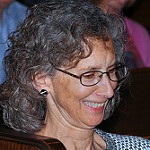During the Canvass time, members are asked to deliver affirmation statements addressing what First Unitarian means to them and why they financially support the church. Here are a few of these statements from the 2017/2018 Pledge Campaign.
 Lisa Ross
Lisa Ross
Good morning. My name is Lisa Ross, and I have been asked to share with you a little bit about what First Unitarian Church means to me. I hope that in hearing about my journey [toward finding community], you will find something that resonates with you.
I grew up in a secular Jewish household, and although my parents were both atheists, they very much identified with being Jewish. I, on the other hand, did not. I went to secular Sunday School at the JCC, but I never felt at home in that community. My Jewish identity was my extended family, and getting together on holidays (and of course, the food!); I loved that sense of belonging, of being part of a tribe. But I couldn’t relate to the religious part of Judaism. And what I really found offensive was the implicit (and sometimes explicit) belief that we, as Jews, were “the chosen people,” somehow better than everyone else – we suffered more than anyone else, we were smarter, wiser, more resilient. I don’t mean to pick on Jews here; this is actually what really bothers me about most organized religion. READ MORE HERE: Lisa Ross Affirmation Statement.pdf
Unlike some of you, I came to this church already in love with the idea of “church.” I loved the small Episcopal Church of my youth, with its stone walls and old stained-glass windows. Jesus looked so sad, yet sympathetic. I was baptized, confirmed, and married in that church. I sang in the choir as a teenager. My husband John and I met there, in Sunday School, when we were 13 years old, and we shared a dynamite Youth Group every Sunday evening through our teen years. READ MORE HERE: Carole Watson Affirmation Statement.pdf

